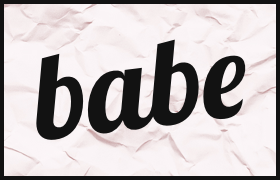
The unspoken agony of not looking like your real ID
You don’t look exactly the same as yesterday or a year ago or whenever that photo was taken – and shame on you
I have a secret and it may shock you: I don’t look the same as I did at 16.
I know. I know. Please take a minute, take all the time you need and process what shocking reality I just proclaimed. I have, in fact, physically changed over the last five years.
Shocking, truly. I know
Hair, height, weight, body shape- you name it and it’s not the same. I’m told that this isn’t unusual for females (or anyone apparently) and that when treated on the street to shouts “MY GOD YOU’VE GROWN”, you should take it in grace and with a blush- because what they’re really telling you is “Thank God you look grew out of that last phase”. And in some respects they are totally right – TGod for the glow up that we all go through (aka that period in time when our aesthetics realizes with a start that it needs to start pulling through and putting in work to let you function as a feasibly attractive and noticeable human entity).
But if it’s true that no one looks the way they did five years before, why do I always feel ashamed when a bouncer examines my state ID? Why do I squirm inside my skin as he takes far too long looking back and forth between my current self and my past self, wondering if the new me is good enough to make up for the old me?
It’s a strange truth that to stand in front of a bouncer, to silently beg acceptance and popularity from the gatekeepers themselves, means constantly questioning whether you are good enough- particularly in terms of how you look. And what happens when you don’t measure up? Even to yourself?
Between the ages of 16 and 21, I discovered so many things about the presentation and self-care of myself. I learned that I loved to run and lift weights to relieve my stress (a process by which naturally reduced my body fat and led to overall weight loss), I learned that blondes really do (sometimes) have more fun after dying and cutting my hair, and I learned that there are certain ways in which I can dress or wear makeup to celebrate my own body and its beauty.
In crude terms and relying on outside validation, I have gotten exponentially “hotter” over the last five years.
God bless the glow up amirite?
But instead of feeling everyday, small victories in these incremental changes that have had major impacts, I feel only more ashamed of myself when I hand a bouncer my ID. I have been greeted by reactions such as “wow”, “huh”, or even laughter as a bouncer looks back and forth between my picture and myself far too many times. I have had bouncers take seconds to minutes longer looking at my ID than some of my friends who more closely resemble their 16 or 15-year-old self and I have even had bouncers deny me entrance to a bar claiming that they needed “to see my real ID”. But they already had it. In their hands.
The look on my face when I was demanded to give my real ID
I’ve been trying to process what all of these interactions mean for us, and especially for females. Does it showcase that even if you grow into your looks, that even if you become more conventionally attractive over time, you have to pay the embarrassment toll price of once looking lesser? Are we supposed to be ashamed of our younger, not picture-perfect (because who ever went to the DMV and knocked that photo out of the park) selves looking back at us from our ID and try and make up for it by being as good-looking as possible now? By always making excuses for how we used to look (as when I had to tell a bouncer that I was aware that I had lost weight), by always wearing well-blended makeup, or by being prepared to be scrutinized and humiliated on the grounds of physical appearance over and over again?
How I feel about the prospect of being continuously rated and reduced: tired
We have created a very strange societal practice wherein we live to be told yes or no on whether we pass the test – always with the hopes that we will be told yes and others told no so that the cycle of superiority and inferiority continues. How else can you feel good about yourself, if not at the expense of others? And what other facet of our society does this more thoroughly and systematically than that of physical appearance? Of measuring up?
When I turned 21 I was forced to renew my license by the state of New York and when I was there I asked for a new license photo because it was free of charge at that time. Nowadays my license never gets more than a cursory glance or the math calculation of birthdates – it gets looked at less often now when I ask for a drink bracelet than it did when all I wanted was entrance into the bar.
And as the internal struggle of embarrassment and humiliation and degradation between myself, my old ID, and the bouncer has subsided, I am coming to realize that there was nothing to apologize or make excuses for in how I looked at 16. In fact, I wasn’t the one who should have been changing all along.
Young me knowing that I look good all the time and society’s the ugly one
